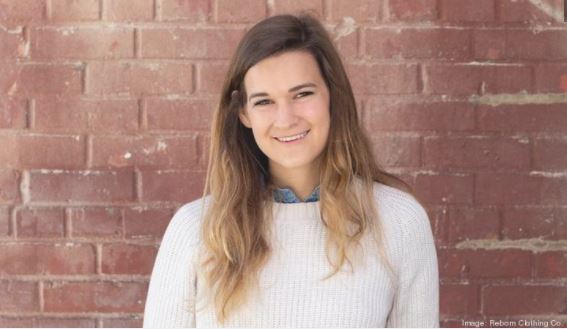A Raleigh upcycling company plans to launch its first retail store at a popular shopping center this summer.
Reborn Clothing Co. will open its new shop at North Hills, 4381 Lassiter at North Hills Ave #105, in July in an effort to expand while working to reduce the growing problem of textile waste. While attending N.C. State, founder and CEO Emily Neville started the company in 2017 as a way for consumers to turn their old clothing into products. But Neville learned there was a larger need to reduce textile waste.
Since then, she has begun working with corporations and universities to repurpose branded products and other surplus items and deadstock.
Customers can send clothing to Reborn’s facility at 6003 Chapel Hill Road in Raleigh, choose a product option from the website, and the company will make it and ship it back. In the coming weeks, customers will have the option to take their apparel to the over 3,000-square-foot North Hills location, where they can work with the designer and the process will begin on site. Also, the store will feature items from ready-made, upcycled products from brands such as Champion, Davis Furniture and other companies.
Reborn Clothing Co. worked with Kane Realty Corp. to lease the space through the end of the year. Neville chose a short-term agreement to test how the company performs in the retail space.
“Now that we’ve scaled, we’re primarily working with manufacturers and subcontractors for sewing,” she said. “We wanted to do something other than going entirely e-commerce and wholesale, so we chose a brick-and-mortar opportunity.”
The company has five employees and seeks to add about three to five more to work at the store. Neville, who graduated in December 2019, said she hopes the retail operations give the startup the push it needs to cross the $1 million threshold for top-line revenue.
In less than 20 years, the amount of clothing Americans discarded jumped from 7 million tons to 14 million tons, according to reports. Nearly 90 percent of material used for clothing production ends up in a landfill, accounting for a lost opportunity of about $100 billion annually, Forbes reported. As a result, the fashion industry and major producers of clothing and textiles are trying to find a balance between sustainability and profitability.
“We’re in the early stages of trying to fix this problem that even our global partners have not solved,” Neville said. “We’re excited about the opportunity that direct-to-consumer allows, which is different from other B2B service solutions for textile waste.”
She has long planned to set up a store location and decided to move forward in time for back-to-school and holiday shopping.
“This is perfect timing for us,” Neville said. “Coming out of Covid, more people are shopping and in North Hills, there’s already a lot of foot traffic. It’s probably the best place to maximize exposure and brand awareness for retail.”
Although retail sales in the U.S. have fluctuated in the past year amid the pandemic, the outlook remains positive, said Gus Faucher, chief economist with PNC.
“Despite the most recent decline, sales in May were 20 percent above their pre-pandemic level; this is thanks to federal government stimulus that has allowed consumers to boost their spending despite huge pandemic-related job losses,” Faucher said.
“Retail sales will grow at a moderate pace going forward, as the positives – lots of household savings, normalizing supply chains, rising wealth due to higher stock prices and home values, an improving labor market, and low interest rates — outweigh the negatives of higher prices and spent-up demand.”
- Categories:



